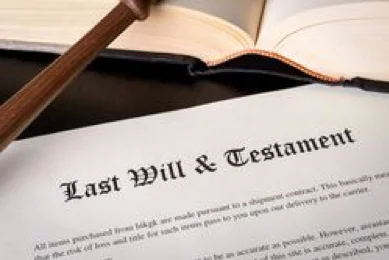
Estate Planning Definition
Estate planning is a series of actions taken to arrange for and anticipate the management of one’s assets during one’s lifetime and the disposition of those assets upon death. The goal of most people is twofold. First, it is to preserve the assets during one’s lifetime. Second, it is to transfer the assets to their desired heirs and organizations. Most people want to minimize taxes and maximize the value of the assets during their lives as well for those who receive the assets upon their passing.
One of the greatest benefits of estate planning is something most people would agree to be priceless: peace of mind. In addition, with the right legal instruments, such as the right type of trust, estate planning can help protect your assets during your lifetime and after your demise. It provides a safety net for your loved ones and can give them financial security when they need it most. You will need to prepare several estate planning documents. These documents often include the following: a will or trust, a durable power of attorney (for healthcare and finances), beneficiary and/or guardianship designations, and a letter of intent. For this article, we will focus on wills and trusts. How are they similar and in what ways do they differ? Which one is more useful in giving your loved ones the financial security and peace of mind you want them to enjoy when you’re gone?
OUTCOME: Financial security for yourself and your loved ones
BENEFIT: Peace of mind
PREVIEW: Documents that you should include in an estate plan, including wills, trust and other important documents

Role of a Will in Estate Planning
Most people are familiar with a last will and testament; indeed, many probably have one. A will is a legal document that contains a person’s instructions in the management and disposition of his or her estate upon death. When people die intestate (without a will) the courts will dispose of their assets and property according to the intestacy laws of the state where they last resided. If you have a specific purpose in mind for your estate when you die, prepare a will that clearly states your wishes. This will spare your family from having to wrestle with the state if the your family’s desires differ from those of the state’s intestacy laws.
Sometimes a will contains provisions for the creation of a testamentary trust, which is an example of an estate planning trust. People often use testamentary trusts to manage assets for minor dependents and/or the surviving spouse of the deceased. However, keep in mind that you can only legally transfer assets that will pass through your estate into a testamentary trust. This means your heirs will likely still pay probate taxes on the assets that are transferred to the testamentary trust when you die.
Having a will is often better than dying intestate. However, the terms of a will and the testamentary trust take effect only after a person’s death. It does not contain provisions in the event a person becomes incapacitated and can no longer make medical or financial decisions on his or her own. This is why living trusts are quickly gaining ground as more-than-adequate alternatives to a last will and testament.

Advantages of a Living Trust in Estate Planning
A living trust, like a will, contains an individual’s instructions regarding the management and disposition of his or her estate upon death. However, a living trust also typically contains instructions in the event the person becomes physically or mentally incapable of managing his or her own affairs. A living trust can become effective while a person is still alive and not only after a person dies. A living trust can help your family carry out your wishes regarding medical treatment or intervention and long-term care when you are no longer able to make these decisions yourself. It is another example of the peace of mind that comes from sound estate planning.
When you set up a living trust, you transfer ownership of your assets to the trust. This means, technically, that you no longer own those assets. The trust does. When a living trust is worded carefully, there is often no need to make a separate will. This means there is no need for a probate, which is the legal process that takes place to ascertain the validity of a will. The probate also proceeds when someone dies without a will or a trust. Probate can be tedious, drawn-out, and expensive. Having a comprehensive living trust instead of a will spares your family from this process. You can, of course, opt to have both a will and a living trust. If you die without a will but have a living trust, the state’s intestacy laws will usually only apply to the assets that are not included in the living trust.

Limits of a Living Trust in Estate Planning
A living trust is often a revocable trust. This means, the trust settlor (the person who establishes and funds the trust) can change the terms of the trust. This can include adding or removing beneficiaries and transferring assets in or out of the trust. For estate planning purposes, this may make sense. After all, circumstances do change and you, as the trust settlor, would want to have the liberty to adjust your living trust as your life evolves.
However, keep in mind that revocable trusts do not have powerful asset protection qualities. The settlor of a revocable trust can continue to exercise control over trust assets. If a revocable living trust is challenged, a court can rule that the assets, in fact, are still part of a person’s estate. In addition, the assets can be taxed and/or distributed according to state intestacy laws if the person died leaving only a revocable living trust and not a will.
Some people are wary of creating an irrevocable trusts, the terms of which they cannot change after the trust is established. But a careful wording of the trust provisions can help you avoid most of the pitfalls. Talk with an experienced estate planning professional who can walk you through the advantages and disadvantages of revocable and irrevocable living trusts. Your choice will largely depend on the amount of risk you are comfortable with, the types of assets you own, and your current and (foreseeable) future financial plans.

The Role of Irrevocable Trusts in Estate Planning
Although they are more often used as asset protection vehicles, irrevocable trusts can play an important role in estate planning as well. When you set up an irrevocable trust, you turn over control of the assets to a trustee. Trust settlors can give their trustees a letter of wishes that states the purpose of the trust and how the trustee is to manage the assets. Once an irrevocable trust has been set up, the settlor no longer directly controls or owns the assets. Assets that have been transferred to an irrevocable trust are protected from probate since they are no longer part of a deceased person’s estate. They are also protected from claims filed against the deceased person’s estate by predatory creditors or dubious ‘heirs.’
You can establish an irrevocable trust domestically or offshore. Under the current U.S. legal climate the courts continue to spit out rulings containing ever-expanding theories of legal liability. This leaves those with assets increasingly exposed to the threat of litigation. As such, taking assets offshore, beyond the reach or U.S. courts become more and more attractive those with assets to protect. Thus, offshore irrevocable trusts have proven to provide far superior asset protection than their domestic counterparts. As above, a seasoned asset protection specialist and estate planning expert can help you make an informed decision that will address your concerns and calm your fears.

Other Important Estate Planning Documents
A word on the other documents that are typically part of estate planning:
- Durable power of attorney (POA): This is a legal document that gives a person you designate the power to act on your behalf when you become incapacitated. Someone who has power of attorney can enter into legally binding financial transactions, dispose of or acquire real estate, and make other legal decisions in your name.
- Healthcare power of attorney: This is a specific type of POA that designates a person to make medical decisions for you if you are no longer able to do so for yourself. Make sure you choose a person (or agency) you can trust to make the same medical decisions you would make for yourself if you were still able to do so.
- Beneficiary designations: Some assets, such as a 401 (k) benefits, can pass directly to your heirs without having to be included in a will or living trust. This will hold up as long as they are the designated beneficiaries of the instrument. Be sure to name a contingent beneficiary on any such accounts you own. Including this information in your estate plan can help clear up any ambiguity.
- Guardianship designations: If you have young children or plan to have children, you should choose a guardian who will agree to raise your children in the event that you should die while they are still minors.
- Letter of intent: While not legally binding, this document will help a probate court understand your intentions for your assets should someone challenge your will in some regard.

Conclusion
Estate planning, when undertaken in a proper and timely manner, can result in the protection and preservation of assets. Consider crafting a living trust in place of, or in addition to, a last will and testament. If you’re confident about your decisions regarding the assets and instructions to be included in your living trust, weigh the advantages of creating an irrevocable living trust instead of a revocable one. It can protect your family from having to pay probate and estate taxes when you’re gone. Through a prudent utilization of various legal instruments, you and your family can enjoy the prime benefits of sound estate planning—peace mind and financial security.



